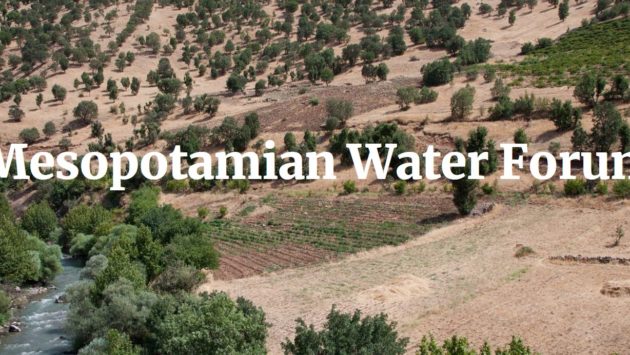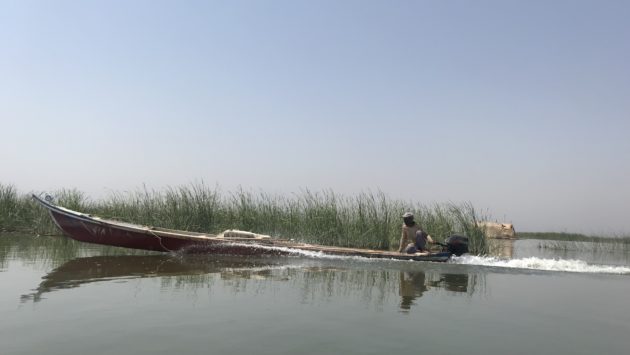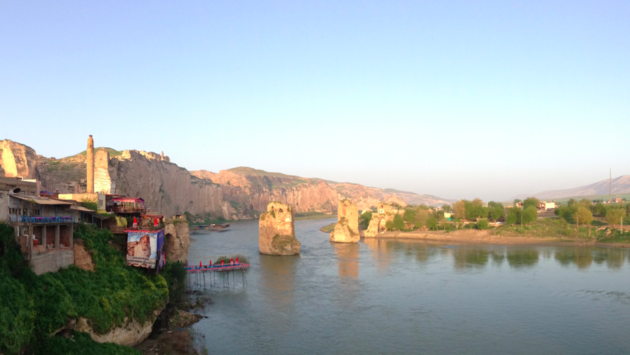Water Must Not be Used as a Weapon of War: Refrain from Civilian and Environmental Harm in Northeast Syria!
Statement by Save the Tigris Campaign, 12 October 2019
On 9 October, Turkey started a military offensive in northeast Syria. A move which will have disastrous consequences for the region. This armed conflict will have a direct impact on populations, ecosystem and post-conflict recovery of the area. Concerns mount of a humanitarian catastrophe.
Water is at risk of being used as a weapon in this conflict: The first reports have appeared of the targeting of water infrastructure: Syrian Democratic Forces (SDF) reported on 10 October that Bouzra Dam, providing water to the city of Derik, was targeted by Turkish warplanes. Other reports confirmed damages to civilian installations: water supplies to Hasakeh city have been interrupted due to damage of Alok water station, which serves 400,000 people in the area, according to OCHA. The politicization of water in northeast Syria has been ongoing since the start of the Syrian conflict. This was evidenced in the past years by the deliberate disruption of water flows from transboundary rivers originating in Turkey. In past summers water flows to Syria were cut on various occasions, while the opening of Turkish dams caused the flooding of agricultural lands in Girê Spî and other areas as recently as last month. In addition, the GAP project in Southeastern Turkey, which includes Ilisu Dam and other dams to be-constructed on the Tigris River, would curb water flows into Syria and Iraq by as much as half.
The targeting of rivers and destruction of water installations, whether dams, desalinisation plants, sewage or other infrastructure, can cause a humanitarian crisis in health and sanitation across the region. Due to years of conflict, much of the water infrastructure in Syria has been lost or not maintained. If dams are targeted there is a major risk of flooding, as was demonstrated in 2017: Tabqa Dam on the Euphrates River was part of a major assault between the SDF and Daesh, which damaged its power station. There was a serious possibility of dam failure, which lead to emigration of populations from the area at risk.

The environment is both a risk factor and a victim of the spiraling conflict in northeast Syria. Human security depends on environmental security. In December 2017 the United Nations Environment Assembly adopted a resolution on conflict pollution, urging states to minimise the health and environmental impacts of pollution caused by armed conflict. The resolution addressed the targeting of water, sanitation networks, and the polluting of rivers with the aim to reduce humanitarian and environmental impacts of conflict pollution.
The legacy of the Syrian conflict has resulted in environmental degradation across northeast Syria. Its communities have suffered from the toxic remnants of war and increased water pollution. In the aftermath of the war with Daesh some areas suffered from contaminated drinking water. Due to the longstanding conflict, the lack of waste management fueled the flow of wastewater directly into rivers without treatment. Affected rivers include the Khabur River (Hasakeh city) and Jaghjagh River (Qamishlo city), tributaries of the Euphrates River.
Yet despite years of conflict, in northeast Syria a society is being built on democratic ecological principles. The environment is being reconstructed following decades of exploitation and war and issues such as water scarcity, desertification and other ecological problems are being addressed. The Democratic Federation of North and East Syria recognized environmental security to be critical for a post-conflict society and invested in reforestation, waste management systems, water conservation and the strengthening of environmental consciousness. Land that was exhausted by war and monoculture was revitalized for communal use through ancient cultivation techniques of the Tigris and Euphrates civilizations. Schools in northeast Syria have been teaching ecology as a fundamental principle.
These gains are now under threat because of military destruction.
We call upon Turkey:
- To immediately halt the invasion of northeast Syria;
- Not to use water and water infrastructure as weapons of war and to refrain from targeting water installations or waterways;
- To guarantee safe access to water as a fundamental human right which should be guaranteed for the population of northeast Syria;
- To adhere to the UNEA-3 resolution ‘Pollution mitigation and control in areas affected by armed conflict or terrorism’ of the United Nations Environment Assembly.
We call upon the international community:
- To use all diplomatic means to pressure Turkey to halt its invasion of North East Syria;
- To monitor the conditions of northeast Syria’s rivers and water infrastructure in order to document any damages or war crimes;
- To hold accountable any party which inflicts humanitarian crises due to the targeting of waterways and water infrastructure through the UNEA-3 resolution ‘Pollution mitigation and control in areas affected by armed conflict or terrorism’ of the United Nations Environment Assembly.
For more information contact Save the Tigris at coordinator.en @ savethetigris.org




